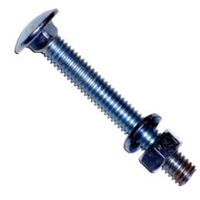What Is A Lock Washer. One of the most typical home maintenance tasks is tightening nuts and bolts. You may get a firmer grip on the nut or bolt by using lock washers, but their efficiency varies depending on how they were built.
When correctly applied, lock washers, for example, guarantee that fasteners do not come loose when under strain.
To give extra strength, the finest models include a ridged or serrated edge, as well as an outside ring with big teeth.
What Is A Lock Washer
The purpose of a lock washer is discussed here.
Lock Washer
A lock washer is a type of washer that produces enough strain to prevent anything from loosening or otherwise coming loose from its installed position.
They aren’t completely flat. Instead, they’re semi-coiled and rise gradually. Installing lock washers adds stress to the bolt, preventing it from rotating.
This avoids what may otherwise be a problem: as bolts spin, they loosen and eventually fall out. Lockwashers come in handy in this situation since they may provide enough strain to prevent anything like this from happening.
Types Of Lock Washer
Below are the different types of lock washers.
Lock Set Pair Lock Washers: Lock Set Pairs are sold as a set with one top and bottom washer.
The interlocking notches and teeth on opposing sides of these reusable washers help them stay in place when their wedges are employed as a fastening mechanism under severe torque and vibration.
Nord Lock Washers are another name for these washers.
Hi-Collar Lock Washers: Because of their tiny outer diameter, these lock washers are perfect for use in circumstances where space is restricted.
They’re made to wrap around the exterior of tiny head screws like socket head cap screws, and their substantial thickness allows them to offer an efficient locking effect even in tight locations. These washers are also known as spring washers or hi-collar lock washers.
Split Lock Washers: There are a few different names for these helical spring lock washers! Because of their form, they’re also known as split ring lock washers and spring washers.
Grainger offers both ordinary and heavy pattern steel spring lock washers. The OD of the normal type is less than that of the heavy pattern, which has a bigger OD that is better suited to heavier applications.
FAQs
Is it necessary to use a lock washer?
When there’s a chance that bolts will back out of their house, lock washers are crucial. You’ll also want to utilize them if there’s a moving component in an installation so you can be sure the friction between the hardware and the material being secured together is working properly.
Are you looking for a lock nut with a lock washer?
If utilizing a nut-and-bolt configuration, place the lock washer between the nut and the work surface, or between the fastener head and the work surface if using a tapped hole design.
Because it’s unsettling for machine operators to have their project’s assembly break apart on them, you must employ nuts and bolts with some sort of “lock washers” to guarantee that the fasteners don’t come apart during vibration or in anticipation of loosening.
Related Guides
